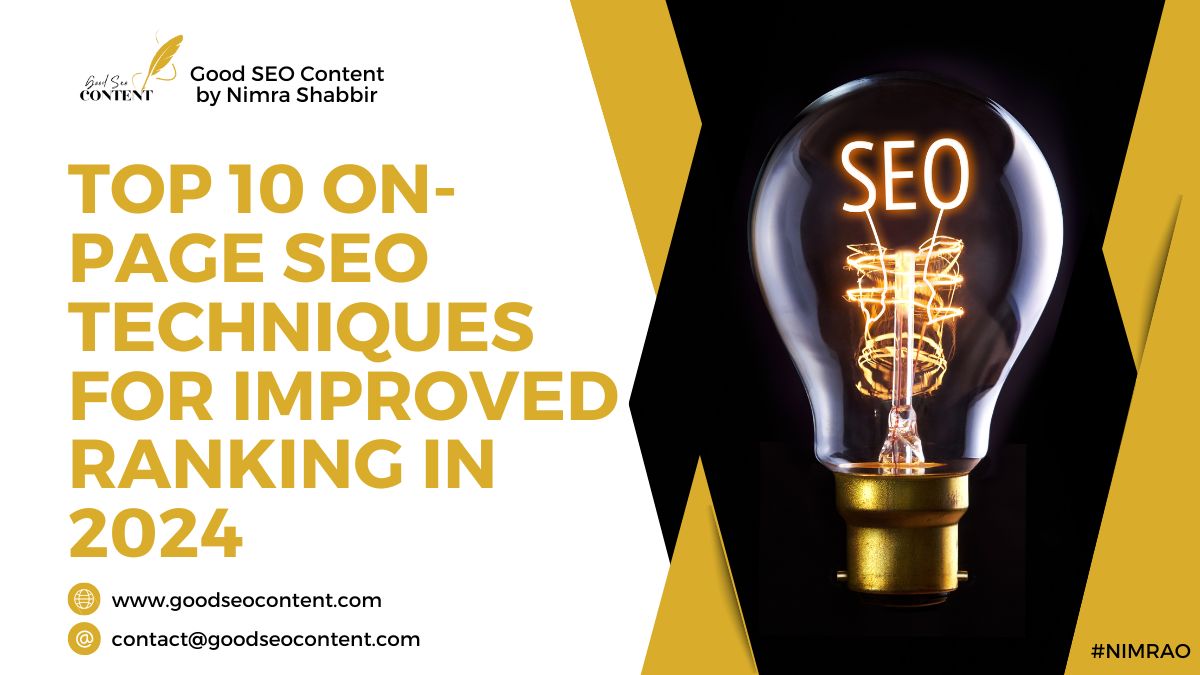Table of Contents
In the fast modern era of digital marketing, keeping up with the latest SEO trends is crucial for maintaining and improving your website’s search engine ranking. As we move further into 2024, here are the top 10 on-page SEO techniques for improved ranking in 2024 you should focus on to enhance your website’s performance and visibility.
Read: Brand awareness for Small businesses

Benefits of Improved Ranking and Importance of SEO Techniques
Achieving a higher search engine ranking offers numerous benefits. Improved ranking leads to increased visibility, which can drive more organic traffic to your website. This, in turn, can result in higher engagement, more leads, and increased conversions. High-ranking websites are often perceived as more trustworthy and authoritative, which can enhance your brand’s reputation. Employing effective SEO techniques is essential for staying competitive in the digital landscape and ensuring your website meets the evolving demands of search engines and users alike.
Top 10 On-Page SEO Techniques for Improved Ranking in 2024
1. Focus on User Experience (UX)
Optimising your website for user experience is more important than ever. Pay attention to Core Web Vitals, which include loading speed, visual stability, and responsiveness. Additionally, ensure your website is mobile-friendly since Google has fully shifted to mobile-first indexing. A smooth, fast, and responsive site keeps users engaged and satisfied, leading to better rankings.
Read: Importance of SEO for small businesses

2. Utilise Internal Linking
Internal linking is a powerful on-page SEO technique. By linking relevant pages within your site using targeted keywords, you help distribute traffic across your website and assist Google in understanding the context of your content. This improves the overall user experience and can lead to higher rankings for your pages.
3. Implement Entity-Based SEO
Entity-based SEO involves incorporating relevant entities, such as concepts and topics, into your content. This helps search engines better understand your content and enhances your expertise, authoritativeness, and trustworthiness (E-A-T). By focusing on entities, you make your content more comprehensive and informative.
4. Repurpose Content into Videos
Video content is increasingly popular and can significantly boost your on-page SEO efforts. Convert your blog posts into videos to reach a wider audience and optimise them for YouTube SEO. Utilise features like attractive thumbnails and detailed descriptions to increase visibility and engagement.
Read: Google core algorithm update
5. Leverage Google Discover
Google Discover is a personalised AI-driven feed that can drive significant traffic to your site. To appear in Google Discover, ensure your content is high-quality and engaging. Use the Max Image Preview meta tag to enhance your content’s visibility in this feed.
6. Update Existing Content
Regularly updating your existing content keeps it relevant and useful. Refresh old blog posts with the latest data and information, add original data, images, and cover missing topics to improve the relevance and value of your content. This can lead to better rankings and more traffic.
7. Optimise for Voice Search
Voice search is becoming more common, and optimising for it can give you an edge. Focus on conversational long-tail keywords and questions that your audience is likely to ask. Additionally, enhance your schema markup to help search engines better understand your content and provide precise answers to voice queries.
Read: Google analytics for small business SEO

8. Target Long-Tail Keywords
Long-tail keywords are less competitive and more specific, making them valuable for on-page SEO. Identify and target these keywords to satisfy the search intent behind specific queries. This can help you attract highly targeted traffic and improve your rankings for niche topics.
9. Analyse Search Intent
Understanding and analysing search intent is crucial for creating content that meets user expectations. Categorise your keywords based on informational, navigational, commercial, or transactional intent, and produce content that aligns with the expected user experience. This ensures your content is relevant and useful, leading to better engagement and rankings.
10. Optimise Technical On-Page SEO
Technical SEO is the foundation of a well-optimised website. Conduct regular site audits to identify and fix any technical issues, such as broken links or slow page speed. Ensure proper implementation of title tags, meta descriptions, URLs, and image optimization to enhance your site’s overall performance and search engine friendliness.
Read: Benefits of influencer marketing

Conclusion
Staying ahead in the SEO game requires continuous learning and adaptation. By focusing on these top 10 on-page SEO techniques for improved ranking in 2024, you can improve your website’s ranking, attract more organic traffic, and provide a better user experience. The benefits of improved ranking, such as increased visibility, higher engagement, and enhanced brand reputation, underscore the importance of implementing effective SEO techniques. Keep updating your strategies and stay informed about the latest SEO trends to maintain a competitive edge in the ever-evolving world of SEO.
In order to get professional SEO consultation advices contact NimRao at contact@goodseocontent.com or you can catch me up at instagram (@nimra_shabbir01), Linkedin (Nimra Shabbir). I would like to consult about your SEO needs so make sure to leave a message!

Top 10 On-Page SEO Techniques for Improved Ranking in 2024 in a Nutshell
Improving your website’s ranking in 2024 involves focusing on user experience (UX) by optimising for Core Web Vitals and ensuring mobile-friendliness. Utilise internal linking to distribute traffic and help search engines understand your content. Implement entity-based SEO to enhance your expertise, authoritativeness, and trustworthiness (E-A-T). Repurpose content into videos for broader reach, and leverage Google Discover for increased visibility.
Regularly update existing content to keep it relevant, optimise for voice search with conversational keywords, and target long-tail keywords to attract specific audiences. Analyse search intent to align content with user expectations and address technical SEO issues to ensure a smooth, efficient website. Lastly, perform regular site audits and conduct content gap analysis to stay competitive and maintain a strong online presence.
Core Web Vitals are a set of metrics introduced by Google that measure the user experience of a web page. They focus on loading speed, visual stability, and responsiveness. These metrics are important for SEO because they directly impact how users interact with your website. A site that loads quickly, remains visually stable, and responds promptly to user inputs provides a better user experience, which can lead to improved search engine rankings.
Internal linking improves your website’s SEO by helping distribute traffic across your site and allowing search engines to understand the context and relationship between different pages. By linking relevant pages with targeted keywords, you create a more cohesive and navigable website, which enhances the user experience and can lead to higher rankings for your individual pages.
Entity-based SEO involves incorporating relevant entities, such as concepts and topics, into your content. This helps search engines better understand the subject matter and context of your content, which can enhance your expertise, authoritativeness, and trustworthiness (E-A-T). By focusing on entities, you make your content more comprehensive and informative, which can improve its relevance and ranking potential.
Updating existing content is important for SEO because it keeps your content relevant, accurate, and useful. Search engines favour fresh and up-to-date information, so regularly refreshing your old blog posts with the latest data, adding original insights, and covering missing topics can improve your content’s relevance and value. This practice can lead to better rankings and more traffic.
Optimising for voice search involves focusing on conversational long-tail keywords and questions that users are likely to ask. Unlike traditional SEO, which often targets shorter, more specific keywords, voice search optimization requires understanding natural language patterns and providing clear, concise answers. Enhancing your schema markup to help search engines understand your content and deliver precise responses to voice queries is also crucial for effective voice search optimization.


1 thought on “Top 10 On-Page SEO Techniques for Improved Ranking in 2024”